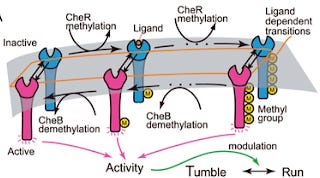Testing Robustness vs Fragility In Chemotaxis

receptor modulation, from doi:10.1371/journal.pone.0011224
Bacterial chemotaxis depends (like most biological functions) upon an intricate signaling network, in which all of the molecules (mostly enzymes) must work in unison. Oleksiuk et al have just published a paper (doi:10.1016/j.cell.2011.03.013) showing convincingly that ambient temperature would affect many of the molecular components of this pathway in E. coli, but the system is optimized to work despite variations in temp.
For example, they show that the pathway's receptor kinases have modification states (see above) with opposing temperature dependencies. So, when the temp changes, the activities of receptors with different mod states compensate for one another to allow the system to maintain the same function.
Since there is apparently a canonical trade-off between robustness and fragility, E. coli's robustness to variability in temperature should come with some costs. One form this cost could take is that it would make a mutation to a temp sensor gene more deleterious. Another form this cost could take is that it would make the bacteria more susceptible to viruses that mess with parts of the temperature regulation system. Maybe some group will show one such cost to be present, or even to be the dominant force? We'll see.

